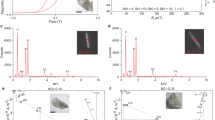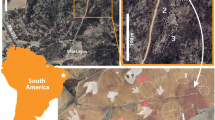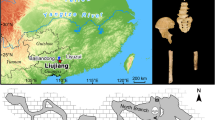Abstract
The origin of the gold mineralization in the Witwaterstrand basin of South Africa—the largest known gold province—has been controversial for decades, with arguments favouring detrital1,2 (placer), modified placer3,4 and hydrothermal5,6 origins. Here we present the results of an extensive geological study of Witwatersrand rocks which show that the gold (and associated uranium) mineralization is hydrothermal in origin and postdates a regional high-temperature alteration event. Alteration processes identified on a small scale can be mapped out regionally as roughly strata-bound zones of acid metasomatism extending far into the basin: the fluid flow responsible for this alteration was concentrated in small-scale structures localized along lithological boundaries. We find that the gold precipitated as a consequence of interactions of the fluid with shale-derived hydrocarbons present within the basin.
This is a preview of subscription content, access via your institution
Access options
Subscribe to this journal
Receive 51 print issues and online access
$199.00 per year
only $3.90 per issue
Buy this article
- Purchase on Springer Link
- Instant access to full article PDF
Prices may be subject to local taxes which are calculated during checkout
Similar content being viewed by others
References
Minter, W. E. L. Can. Soc. Petrol. Geol. Mem. 5, 801–829 (1978).
Hallbauer, D. K. in Mineral Deposits of Southern Africa (eds Anhaeusser, C. R. & Maske, S.) 731–752 (Geol. Soc. S. Africa, Johannesburg, 1986).
Frimmel, H. E., Le Roux, A. P., Knight, J. & Minter, W. E. L. Econ. Geol. 88, 249–265 (1993).
Robb, L. J. & Meyer, F. M. Ore Geol. Rev. 10, 67–94 (1995).
Phillips, G. N., Myers, R. E. & Palmer, J. A. Geology 15, 1027–1030 (1987).
Phillips, G. N. & Myers, R. E. Econ. Geol. Monogr. 6, 597–607 (1989).
Coward, M. P., Spencer, R. M. & Spencer, C. E. Early Precambrian Processes, 243–269 (Spec. Publ. 95, Geol. Soc. Lond., 1995).
Phillips, G. N. & Law, J. D. M. Ore Geol. Rev. 9, 1–31 (1994).
Schidolowski, M. US Geol. Surv. Prof. Pap. 1161N, 1–29 (1981).
Phillips, G. N. J. Metam. Geol. 6, 311–332 (1988).
Minter, W. E. L., Geodhart, M., Knight, J. & Frimmel, H. E. Econ. Geol. 88, 237–248 (1993).
Gray, G. J., Lawrence, S. R., Kenyon, A. K. & Cornford, C. J. Geol. Soc. Lond. (in the press).
Ebert, L. B. et al. Ore Geol. Rev. 5, 423–444 (1990).
Holland, H. D. & Feakes, C. R. J. Geol. 97, 761–762 (1989).
Smith, N. D. Geology 17, 91–92 (1989).
Author information
Authors and Affiliations
Rights and permissions
About this article
Cite this article
Barnicoat, A., Henderson, I., Knipe, R. et al. Hydrothermal gold mineralization in the Witwatersrand basin. Nature 386, 820–824 (1997). https://doi.org/10.1038/386820a0
Received:
Accepted:
Issue Date:
DOI: https://doi.org/10.1038/386820a0
This article is cited by
-
A modified paleoplacer model for the metaconglomerate-hosted gold deposits at Jacobina, Brazil
Mineralium Deposita (2024)
-
An underexploited invisible gold resource in the Archean sulphides of the Witwatersrand tailings dumps
Scientific Reports (2023)
-
Local and Target Exploration of Conglomerate-Hosted Gold Deposits Using Machine Learning Algorithms: A Case Study of the Witwatersrand Gold Ores, South Africa
Natural Resources Research (2020)
-
Association of gold with uraninite and pyrobitumen in the metavolcanic rock hosted hydrothermal Au-U mineralisation at Rompas, Peräpohja Schist Belt, northern Finland
Mineralium Deposita (2016)
-
Witwatersrand gold deposits formed by volcanic rain, anoxic rivers and Archaean life
Nature Geoscience (2015)
Comments
By submitting a comment you agree to abide by our Terms and Community Guidelines. If you find something abusive or that does not comply with our terms or guidelines please flag it as inappropriate.



